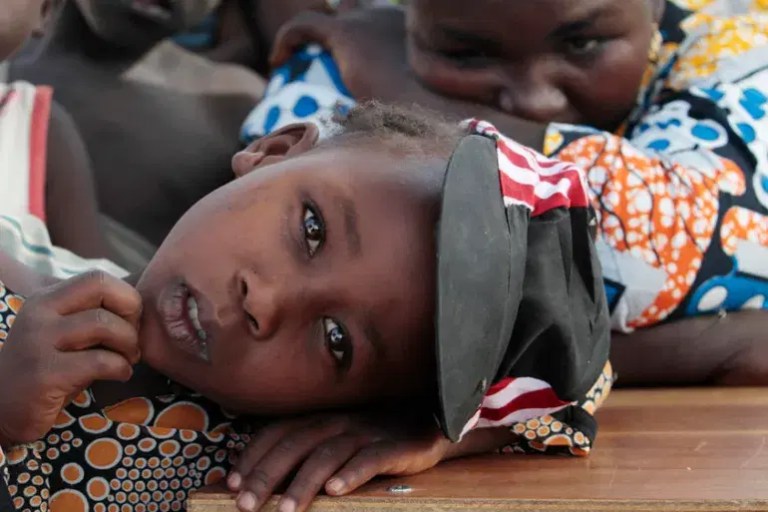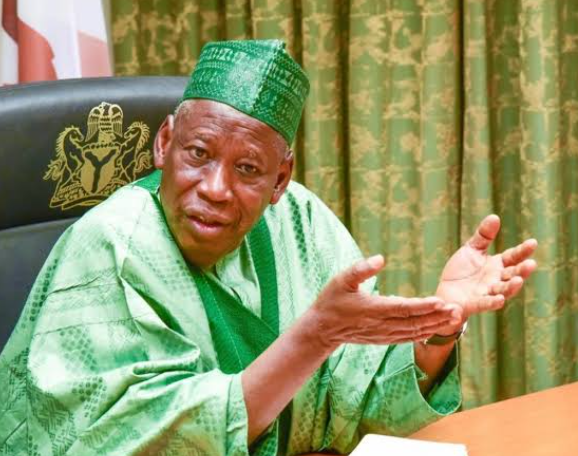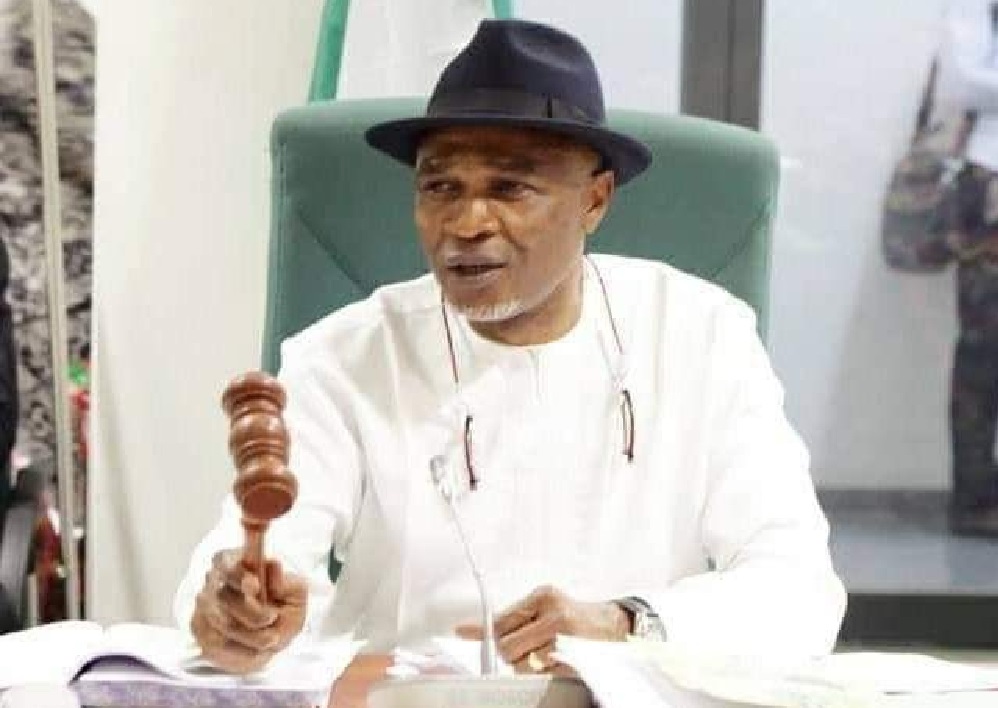News
Report Reveals Why 53.9% Of Nigerian Children Live In Multi-Dimensional Poverty

The Situation Analysis (SitAn) of Children in Nigeria Report has revealed the factors contributing to the staggering 53.9% of children in the country living in multi-dimensional poverty.
Released during the 2024 World Children’s Day celebrations on November 20, this report is a policy document developed by the Federal Government with assistance from the United Nations Children’s Fund (UNICEF) to identify and analyze child-related issues.
According to the report, several key factors such as corruption, unemployment, lack of political will, violence, insurgency, and insufficient investment in social sectors significantly contribute to child poverty in Nigeria. Furthermore, issues like displacement and resettlement add to the strain on limited resources, worsening child poverty across the nation.
The report characterizes child poverty as “a condition where children are deprived of the material, emotional, and spiritual resources necessary to survive, develop, and thrive, thereby hindering their ability to enjoy their rights, reach their full potential, and participate as equal members of society.”
Advertisement
It identifies seven indicators of child poverty: health, water, sanitation, nutrition, shelter, education, and information.
In detailing the Multidimensional Poverty Index (MPI) analysis, the report notes that disparities in child poverty rates exist across Nigeria’s 36 states and the Federal Capital Territory (FCT). For instance, Osun State reports the lowest poverty incidence at 17.5%, with a deprivation rate of 35.5% and an HDI ranking of 14th. In contrast, Sokoto State experiences a high poverty incidence of 89.9% and a deprivation rate of 50.4%, ranking 37th in HDI.
The report indicates a stark difference between urban and rural areas, with 29.7% of urban children classified as multi-dimensionally poor compared to 65.7% of rural children. Notably, children in Sokoto (80.4%), Kebbi (74.9%), and Zamfara (74%) face the most severe deprivation.
Conversely, fewer than 20% of children in Edo (19%) and Lagos (17.3%) live in multi-dimensional poverty. Children in Sokoto experience deprivation in 74.1% of the total indicators, whereas the figure is only 57.7% for those in Lagos.
Advertisement
The report also observes that larger households, especially those with uneducated heads, exhibit higher rates of multi-dimensional deprivation. It highlights that children with illiterate mothers are more likely to suffer from poverty than those with educated mothers.
A particularly alarming situation is presented regarding Almajiri children, who are often homeless and lack basic necessities such as proper housing, nutrition, clean water, sanitation, healthcare, education, and parental care. They frequently face violence and abuse and are vulnerable to exploitation during conflicts.
To address these issues, the report calls for action from various stakeholders. Families and caregivers are deemed essential in alleviating child poverty and ensuring children’s protection. Public healthcare, education, and social services are critical for helping children escape poverty, and these services must be inclusive, affordable, and accessible.
Effective governance at all levels is necessary to implement sound policies, ensure equitable resource distribution, and invest in household livelihoods—ultimately reducing poverty and promoting children’s rights. The government is urged to provide sustainable minimum income support to families, mitigating financial barriers that hinder children’s development.
The SitAn report was first published in 2022, relying on data from the Multiple Indicator Cluster Survey (MICS 2016-2017) and the Demographic and Health Survey (DHS 2018). An updated version was launched in 2024 to further bolster governmental efforts in shaping policies and directing investments to benefit Nigerian children.
News
Plateau 51: Mutfwang mourns, says “we failed you”, begs affected community

Governor Caleb Mutfwang of Plateau State has apologised to the people of Bassa Local Government Area (LGA) for the failure of government and security agencies to protect lives and properties.
Fifty-one persons were gunned down early Monday in the Zikke community of the LGA, with houses razed and many displaced about two weeks after a similar attack led to the killing of scores of persons in Bokkos Local Government Area.
Less than two days after the most recent assault, Governor Mutfwang apologised for the government’s inability to protect the people.
Fifty-one persons were gunned down early Monday in the Zikke community of the LGA, with houses razed and many displaced about two weeks after a similar attack led to the killing of scores of persons in Bokkos Local Government Area.
Less than two days after the most recent assault, Governor Mutfwang apologised for the government’s inability to protect the people.
The governor said this on Tuesday at the palace of the Paramount Ruler in Miango.
“I will tell you the truth: I have been crying since yesterday because I had trusted God that all the arrangements were put in place, that this will not happen again. We have made investments in security,” he said.
But like all human arrangements, sometimes they fail. I want to admit that on Sunday night into Monday morning, we failed you. Please, forgive me.”
He urged the people not to relent in their efforts to secure their communities and ensure that they complement security agencies’ efforts by providing vital information for intelligence gathering and expose the antics of the criminals.
Governor Mutfwang, in the company of security chiefs and members of the state executive council, was in Zikke community to commiserate with the people on the death of over fifty persons killed in Monday’s attacks.
The Paramount Ruler of Irigwe land, Ronku Aka, who is the Brangwe of Irigwe, urged the government to come to the aid of the communities with the provision of social amenities in the area.
The governor and the entourage also went to see some of the families who lost their loved ones in the attack. The victims have been buried just as members of the community demanded action to stem the rising wave of insecurity in the state.
Plateau State has been a hotbed of attacks, but the renewed spate of attacks adds a fresh layer of twist to the decades-long crisis rocking the North-Central state.
After the most recent assaults, President Bola Tinubu ordered security agencies to fish out the masterminds, describing the attacks as condemnable.
While experts have linked the lingering Plateau crisis to farmers-herders tussle for resources, Governor Muftwang said it was sponsored and genocidal.
According to him, over 64 communities in the state have been taken over by gunmen.
News
Court reserves verdict in Ganduje, seven others alleged financial infractions case

The Kano State High Court on Tuesday reserved ruling in the high-profile case involving the National Chairman of the All Progressives Congress (APC), Dr. Abdullahi Umar Ganduje, and seven others, who are facing an eight-count charge bordering on bribery, misappropriation, and diversion of public funds.
The case, instituted by the Kano State Government, lists Ganduje, his wife Hafsat Umar, Abubakar Bawuro, Umar Abdullahi Umar, Jibrilla Muhammad, Lamash Properties Limited, Safari Textiles Limited, and Lasage General Enterprises Limited as defendants.
When the case came up for hearing, the legal teams for all defendants presented various preliminary objections challenging the jurisdiction of the court and filed applications for extension of time.
Leading the defence for Ganduje, his wife, and Umar, Offiong Offiong (SAN) told the court: “We filed our preliminary objection dated November 18, 2024, supported by a 28-paragraph affidavit and a written address. We also filed a reply on point of law dated April 4, 2025. We urge the court to grant our application.”
On the other hand, the prosecution led by Adeola Adedipe, SAN, maintained that the defence applications lacked merit.
“The state’s reply to the preliminary objection is dated October 22, 2024. It is backed by a seven-paragraph counter affidavit and a written address with supporting documents,” Adedipe said.
“We urge the court to dismiss the applications in their entirety.”
Counsel to the 3rd and 7th defendants, Adekunle Taiye-Falola, filed a similar preliminary objection dated October 18, 2024.
In response to the complainant’s counter affidavit, we submitted a further and better affidavit dated December 12, 2024, along with a reply on point of law. We respectfully urge the court to grant the application,” he said.
Sunusi Musa, SAN, representing the 5th defendant, filed his own objection with similar supporting documents.
“We are seeking not just a grant of our application, but also substantial costs against the complainant,” Musa added.
Ashafa Yusuf, counsel to the 6th respondent, noted: “Our notice of preliminary objection was dated September 9, 2024. We filed a further and better affidavit on February 17, 2025, and a reply on point of law. We request the court to grant our reliefs.
For the 8th defendant, counsel Faruk Asekome also filed a preliminary objection and followed up with a further affidavit and legal reply dated February 13, 2025.
“We have complied fully with the procedural requirements, and we ask the court to grant the application,” he said.
Presiding over the case, Justice Amina Adamu-Aliyu granted the applications for an extension of time. She, however, reserved ruling on the preliminary objections.
“Ruling on the notices of preliminary objection is hereby reserved. A new date will be communicated to all parties in due course,” Justice Adamu-Aliyu stated.
The court’s eventual decision on jurisdiction is expected to determine whether the trial will proceed or be dismissed at this stage.
News
Reps Minority Caucus decries incessant tanker fire explosions, call for decisive actions to avert future occurrences

Following the twin tanker fire explosions which occurred last weekend in Ibadan, Oyo state, and Akwanga, Nasarawa state, the Minority Caucus in the House of Representatives expressed shock and sadness over the unfortunate incidents.
The Reps Minority Caucus made this disclosure in a statement jointly signed by leaders of the caucus: Rep. O.K Chinda
(Minority Leader) Rt. Hon. Dr. Ali Isa J.C (Minority Whip) Rt. Hon. Aliyu Madaki (Deputy Minority Leader) Rt. Hon. George Ozodinobi
(Deputy Minority Whip) on Monday stating that:
“Thankfully, no lives were lost at the two avoidable incidents. But it is painful that an unspecified number of vehicles, shops, motorcycles, and other properties worth hundreds of million naira were lost; particularly at the Ibadan incident.
“It is more worrisome that this is coming at a time that the economic hardship is approaching it’s zenith in Nigeria.
The Caucus recalls that after the January tanker fire explosion in Niger state, where lives of Nigerians and humongous properties were lost, it called on the Federal Government for necessary actions.
“Happily, the government resolved to ban fuel tankers with capacities exceeding 60,000 litres of petroleum motor spirit (popularly called petrol) from operating on Nigerian roads with effect from March 1, 2025.
“However, it is disheartening that, from reports across the country, many fuel tankers are yet to comply with the directive. More ludicrous is that the Nigerian Midstream and Downstream Petroleum Regulatory Authority (NMDPRA) responsible for enforcing the regulation is yet to comply with the presidential directive; about six weeks after the kick-off date.
Apparently disturbed about the frequency of tanker explosions across the country; almost becoming permanent fixtures on challenges bedeviling Nigeria, and the damaging effects on our people, the environment, and national development, the Caucus strongly calls for deliberate and decisive actions to stem the same by the bud.
” We call on the federal government for more pro-active measures that will not only avert future occurrences but stop tanker explosions in the country.
“From reports, the Ibadan incident happened as the driver encountered difficulties navigating deteriorated portions of the Toll Gate end of the Lagos-Ibadan expressway.
“Given the deplorable state of this road, and similar others, the Caucus urges the Federal Roads Maintenance Agency (FERMA) to carry out immediate rehabilitation works on these roads.
“The Caucus shall initiate, collaborate, and pursue every legislative action that will secure the safety of our people, and properties; which is the main purpose of government.
-

 News8 hours ago
News8 hours agoSHOCKING! One month after giving birth, woman discovers another baby in her womb
-

 News8 hours ago
News8 hours agoTears, anguish as Plateau Community buries 51 killed by bandits
-

 News7 hours ago
News7 hours agoAngry investors raid CBEX office, loot assets in Ibadan after digital Platform crash
-

 News14 hours ago
News14 hours agoPeter Obi speaks as Benue govt. blocks humanitarian visit
-

 News14 hours ago
News14 hours agoFUOYE VC suspended over sexual harassment allegations
-

 News7 hours ago
News7 hours ago‘Not something I’d wish on anyone’ — Melinda Gates opens up on divorce
-

 News6 hours ago
News6 hours agoCBEX: 60 fraudulent Ponzi scheme operators to avoid in Nigeria
-

 Politics8 hours ago
Politics8 hours agoIgbo Youths Set To Mobilize 5 Million Man-March In Support Of Tinubu, Kalu


















